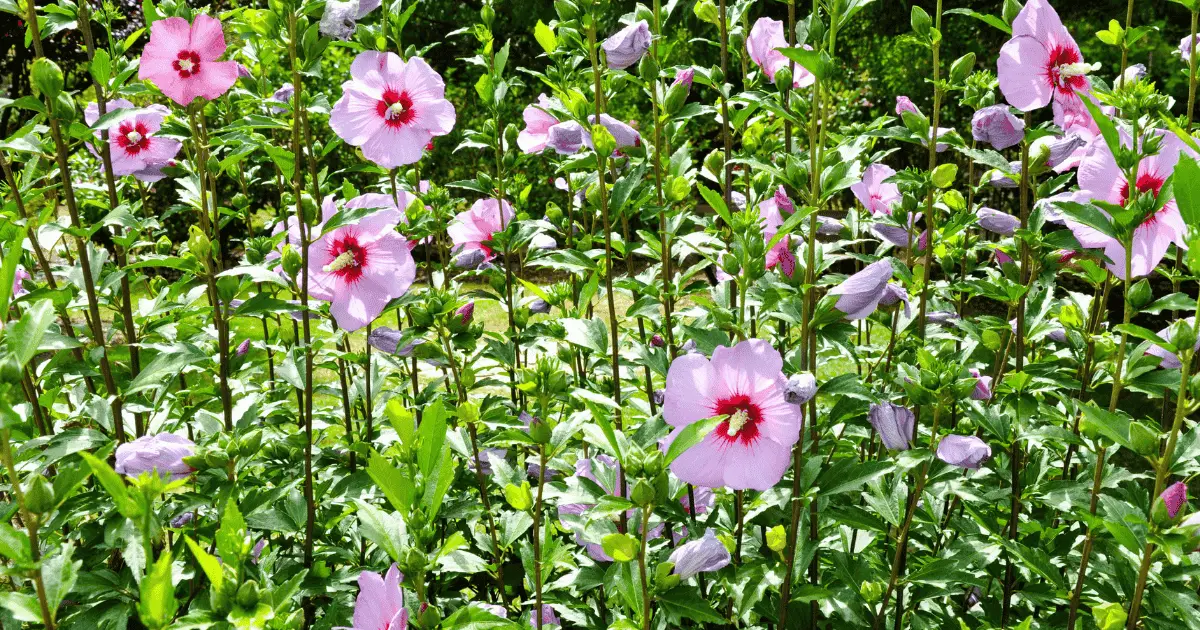Rose of Sharon, a hardy and beautiful flowering shrub, can bring life to your garden. But when it spreads uncontrollably, it can turn from a decorative plant into an invasive nuisance. Many homeowners in the USA wonder if vinegar, a standard household product, can effectively kill Rose of Sharon without using chemical herbicides.
This guide will explore whether vinegar works, how to use it properly, and alternative methods to control or eliminate Rose of Sharon. Let’s dive into the details to help you maintain a well-managed garden!
What Is Rose of Sharon, and Why Can It Become a Problem?
Rose of Sharon (Hibiscus syriacus) is a deciduous shrub cherished for its vibrant blooms that appear in summer and fall. While it’s an excellent choice for ornamental gardening, this plant produces many seeds, which can lead to rapid spread if not appropriately managed.
Uncontrolled growth of Rose of Sharon can:
- Crowd out native plants in your garden.
- Create a messy, overgrown appearance.
- It requires extra effort to control once it’s established.
Understanding the problem is the first step toward finding a solution.
Will Vinegar Kill Rose of Sharon?
Vinegar can kill Rose of Sharon, but only under specific conditions. Vinegar contains acetic acid, which can damage and kill plants by drying out their leaves and disrupting their cellular structure. However, its effectiveness depends on factors like:
- Concentration of vinegar: Household vinegar (5% acetic acid) may damage young plants but is less effective on established shrubs.
- Application method: Applying vinegar directly to leaves and stems is critical for results.
- Plant maturity: Mature Rose of Sharon plants with extensive root systems may survive vinegar treatment and regrow.
Pro Tip: Horticultural vinegar (20%- 30% acetic acid) is more effective for tougher plants like Rose of Sharon, but it should be handled with care.
How to Use Vinegar to Kill Rose of Sharon
Step 1: Choose the Right Vinegar
- Use horticultural vinegar for best results on mature plants.
- For young plants, household vinegar might suffice.
Step 2: Prepare the Area
- Wear gloves and goggles to protect your skin and eyes.
- Cover nearby plants to avoid unintentional damage.
Step 3: Apply Vinegar
- Use a spray bottle to coat the leaves and stems thoroughly.
- Choose a hot, sunny day for application, as sunlight increases vinegar’s effectiveness.
Step 4: Repeat the Process
- Check the plant after a few days.
- Reapply vinegar if regrowth appears.
Limitations of Using Vinegar
While vinegar can be helpful, it’s not always the most reliable solution for killing Rose of Sharon. Here’s why:
- Limited root impact: Vinegar damages leaves and stems but doesn’t penetrate deep into the root system, allowing the plant to regrow.
- Non-selective: Vinegar can harm surrounding plants and grass if sprayed carelessly.
- Soil effects: Excessive use can lower soil pH, making it unsuitable for other plants.
Alternative Methods to Kill Rose of Sharon
If vinegar doesn’t deliver the results you need, consider these alternatives:
1.Digging Out the Plant
- Use a shovel to dig around the base of the plant.
- Remove the root ball entirely to prevent regrowth.
- This method is labour-intensive but highly effective for mature shrubs.
2.Smothering with Mulch
- Cover the base of the plant with thick mulch or a tarp to block sunlight.
- Over time, the lack of light will weaken and kill the plant.
3.Chemical Herbicides
- For stubborn plants, use a glyphosate-based herbicide.
- Apply directly to the leaves and stems, following the product instructions.
4.Regular Pruning
- Prune flowers before seeds develop to prevent spreading.
- Over time, consistent pruning weakens the plant.
Preventing Rose of Sharon from Becoming Invasive
Prevention is always better than removal. Here’s how to keep Rose of Sharon under control:
- Deadhead flowers: Remove blooms before they go to seed.
- Monitor seedlings: Regularly check your garden for young plants and remove them early.
- Plant in containers: Growing Rose of Sharon in pots or designated areas can limit its spread.
FAQs About Killing Rose of Sharon
1. Can vinegar kill the roots of Rose of Sharon?
No, vinegar primarily damages the leaves and stems. It doesn’t penetrate deeply enough to kill the roots, so regrowth is possible.
2. Is horticultural vinegar safe to use?
Horticultural vinegar is effective but highly concentrated. Always wear protective gear cautiously to avoid skin burns or inhalation risks.
3. How long does it take for vinegar to kill a plant?
Visible damage can occur within 24 hours, but complete kill-off may take several applications over a few weeks.
4. Will vinegar harm my soil?
Excessive vinegar use can temporarily lower the soil pH, making it acidic. If you plan to replant, flush the area with water and monitor soil health.
5. What is the best time to apply vinegar?
Apply vinegar on sunny, warm days when the plant grows for maximum effectiveness.
What's the Best Approach for You?
Vinegar can effectively kill Rose of Sharon, especially for younger plants or as part of a broader management strategy. However, its limitations mean it might only work in some situations. Combining vinegar with other methods, like digging or herbicides, often delivers better results for mature or invasive plants.
Take control of your garden and prevent Rose of Sharon from becoming a nuisance. If you’re ready to tackle this issue, start with a safe and practical solution like vinegar and adapt as needed.
Want more gardening tips and tricks? Subscribe to our newsletter for expert advice tailored to USA gardeners!


